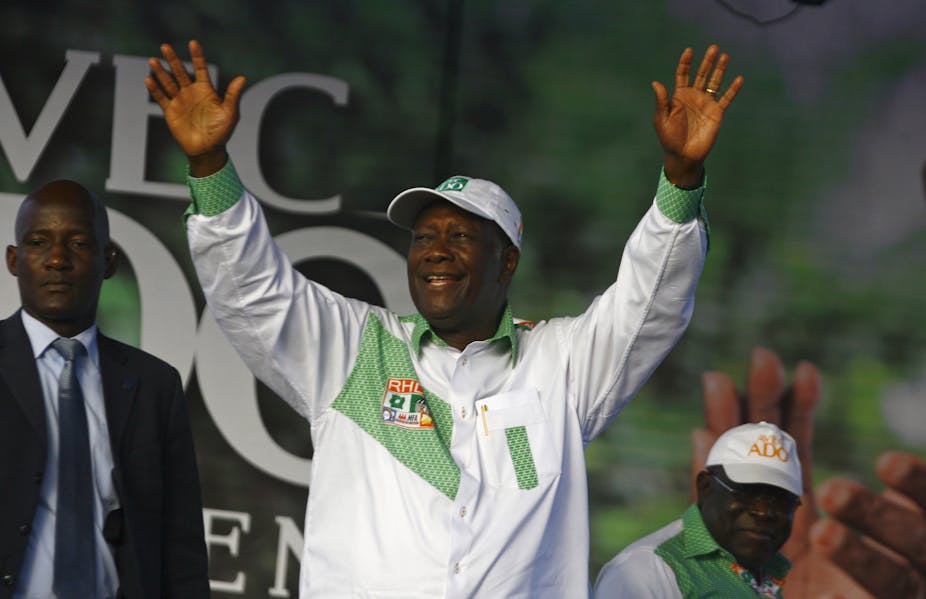Ivory Coast is rapidly becoming a politically capable democracy – one able to inspire and partner with its neighbours in recovering from decades of chaos and state collapse. It is a counterpoint to more general international fears of democracy’s decline.
Just four years ago, global news from Ivory Coast was of civil war. More than 3000 civilians were killed following disputed elections in 2010 before French and UN forces intervened.
The intervention allowed Alassane Ouattara to be inaugurated. He had won the country’s first internationally supervised and most inclusive democratic election since the end of French colonialism in 1960.
Ivory Coast’s 2015 democratic election may be another example of good news out of Africa that gets ignored by the global media. Their editors still claim that readers are more interested in Africa’s disasters, disease and deadly conflicts.
The annual Ibrahim Index of African Governance, normally a reservoir of Afro-optimism, has glumly concluded that democracy across Africa appears to have stalled. But among all 54 countries surveyed, Ivory Coast has shown the highest rate of improvement since 2011.
Stability despite dictatorship
Prior to 2011, the country’s politics had been stifled during the three decades of Felix Houphouet-Boigny’s autocratic rule. Ironically, this was a period of relative stability and a prosperous plantation economy reliant on a huge inflow of workers from neighbouring countries.
Houphouet-Boigny died in 1993. Following his death, Ivory Coast entered a period of escalating ethnic tensions and xenophobia, and its economy declined.
Laurent Gbagbo won a flawed presidential election in 2000 in the wake of a brief military coup. His mandate ended in 2005 but he managed to hang onto power despite increased violence and the presence of a substantial UN peacekeeping force.
As his legitimacy in office eroded, Gbagbo finally agreed to hold internationally monitored elections in 2010. He was convinced he would win, expel the UN, and entrench his control of the Ivorian state.
When former Ghananian president John Kufuor and I led the Carter Centre’s observation mission for the 2010 election we met all the major candidates. We urged them to respect the results whoever was certified the winner. But during dinner with Gbagbo, as the votes were being counted, he was surprisingly blunt in signalling his determination to do whatever he deemed necessary to hold onto office.
True to threat, he fought the outcome – which showed that he had lost a credible vote – until he was taken into custody by UN-backed French troops. He was later indicted by the International Criminal Court for alleged post-election crimes.
A new beginning
Ouattara surprised Gbagbo and many others by winning the votes of the Baoule ethnic group, one of the largest in Ivory Coast. It was once led by Houphouet-Boigny, and since then has been led by Henri Konan Bedie.
With Bedie’s continued backing and the remnants of Gbagbo’s party divided, Ouattara’s mandate seems secure. This is despite some leaders boycotting the 2015 election and isolated but alarming acts of violence. Fears of violence persist in many communities and may be responsible for lower-than-forecast voter registration and turnout.
This could somehow weaken Ouattara’s ability to carry out further reforms. He has so far managed to enact some reforms under very difficult circumstances. The good effect on the country set as an example to other post-conflict countries.
In 2011 the economy was contracting at an alarming rate of 4.7%. Two years later, with improved cocoa production and prices, the economy had turned around and was growing at more than 8%.
As a former International Monetary Fund official, Ouattara had both the knowledge and the contacts to carry out much-needed reforms and enlist the support of foreign donors and investors. This generated employment and built much-needed housing, roads, bridges and other infrastructure. The country’s Investment Board director, Emmanuel Essis, recently forecast a record US$1 billion in private investment this year – double the inflow in 2014.
Of even greater importance have been the improvements in state capacity and good governance, albeit from a very low base after the civil war. According to the sector analyses in the Ibrahim Index, this has been highest in the critical areas of personal safety, rule of law, political participation and human rights. If these trends continue the benefits could also set a good example for Ivory Coast’s neighbours.
Confounding sceptics
In the 1990s, Liberia and Sierra Leone collapsed with warring militias, using child soldiers, and guilty of terrible atrocities, raising fears that what was to unfold in West Africa might be a harbinger of what American journalist Robert Kaplan called “the coming anarchy” in 1994.
Twenty years later, Kaplan’s dismal forecast can be discounted. Conditions are much improved in West Africa. This is despite the still-weak states of Liberia, Sierra Leone and Guinea struggling to cope with the ravages of the recent Ebola epidemic. And Ivory Coast’s northern neighbour Burkina Faso, where Outtara has family ties, appears for now to be a failing state.
If Ouattara has a second term as successful as his first, African historians may one day view his 2015 re-election as a tipping point in Ivory Coast’s struggle to become a politically capable democracy. It may become a leader in countering the temptation to revert to authoritarianism as a more stable but ultimately unreliable alternative.

